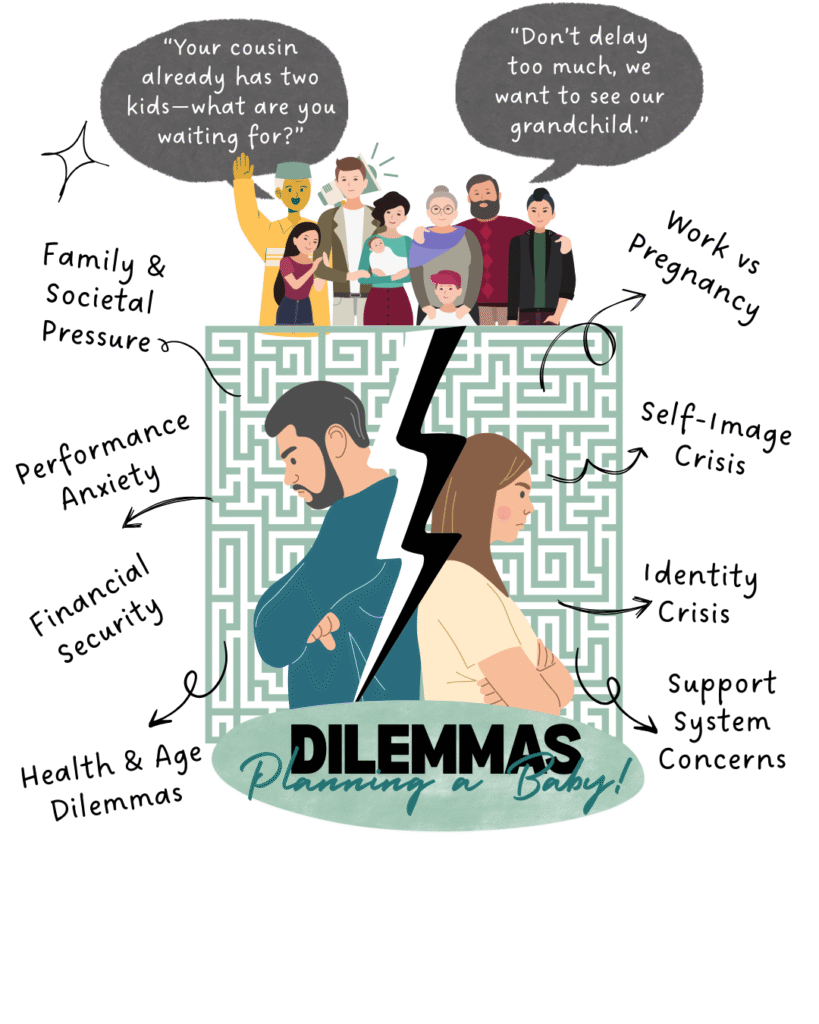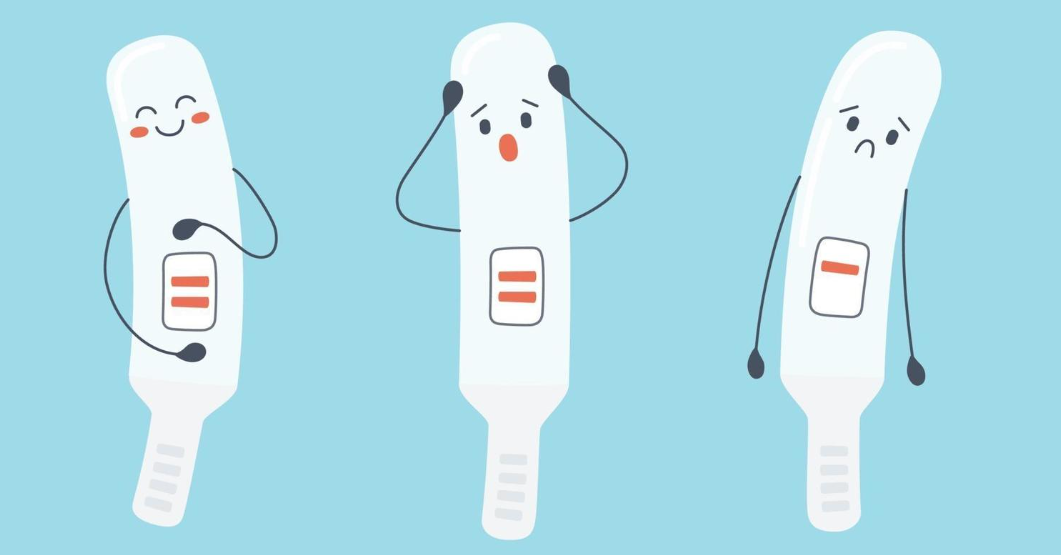“Your cousin already has two kids—what are you waiting for?”
“Don’t delay too much, we want to see our grandchild.”
“Kids are so expensive these days, from diapers to IIT coaching.”
Deciding whether to become pregnant isn’t just about biology—it’s about identity, career, love, health, and the never-ending chorus of family and societal opinions. Many couples today feel stuck in this tug-of-war, wondering if it’s the “right time” to start a family. If you’re battling this dilemma, you’re not alone. Let’s break down the most common struggles and how to navigate them with clarity.

Work vs Pregnancy: The Maternity Penalty
For many women, one of the biggest dilemmas is career vs pregnancy. You might hear people say, “Are you sure you want that promotion? You might go on maternity leave.” The reality is that working mothers often face what’s called the “maternity penalty”—delayed promotions, lost opportunities, or bias from employers. This can lead to guilt on both sides: Should you delay motherhood for your career, or “pause” your ambition for a baby?
The solution lies in strategic planning. Build a financial cushion, document your performance at work, and negotiate flexible arrangements early. Joining communities of working parents can also show you that it’s possible to balance career growth with parenthood.
Family & Societal Pressure
No blog about pregnancy dilemmas is complete without addressing family and social pressure. Many women hear lines like, “Career can wait; your biological clock won’t,” or, “Your cousin already has two kids, why not you?” For men, it often sounds like, “A man isn’t complete till he’s a father.” These comments create unnecessary timelines dictated by others, not by you.
The reality is that these expectations often ignore the couple’s readiness, health, and lifestyle. Setting healthy boundaries, practicing clear communication, and seeking counseling when needed can help couples step away from noise and make choices on their own terms.
Health & Age Dilemmas
You’ve probably heard it: “Fertility drops after 30—don’t risk it.” Yes, age and fertility health matter, but this narrative can cause panic. Men’s health and age also play a role in conception, though rarely discussed. For women who’ve faced miscarriage, the dilemma goes deeper: “Don’t stress this time or it might happen again.” These experiences leave invisible scars that add weight to the decision.
The reality is that readiness is about health plus emotional support, not just age. A preconception health check for both partners, managing conditions like thyroid or PCOS, and addressing the emotional trauma of past loss can bring back confidence in the journey ahead.
Relationship Readiness
Another crucial question is: “Is our relationship strong enough for this step?” Families may say, “A baby will bring you closer,” but the truth is that children amplify whatever is already in the relationship—whether connection or cracks.
Building readiness means investing in your bond first. Simple practices like weekly couple check-ins, open conversations about fears, or even couple’s yoga or therapy sessions can build resilience. Parenthood should add to a partnership, not test it to breaking point.
Performance Anxiety in Men
One hidden dilemma that men rarely voice is sexual performance anxiety. The inner fear sounds like: “Will I be able to satisfy my partner? If I can’t even handle intimacy, how will I handle fatherhood?” Trying for a baby often puts pressure on men, turning intimacy into a stressful “performance test.”
The reality is that this has nothing to do with masculinity—it’s stress-driven. Solutions include focusing on connection rather than just fertility windows, reducing lifestyle stressors, and seeking help from a sex therapist if needed. With the right guidance, sexual confidence can be rebuilt naturally.
Self-Image Crisis in Women & Men
Both men and women sometimes struggle with a self-image crisis: “Am I capable of having a baby? I still feel like a child myself.” This fear is rarely spoken out loud but is surprisingly common. The thought of suddenly becoming responsible for another life feels overwhelming, especially for those who still feel like they’re figuring out adulthood.
The key is to take small steps to build confidence. Managing your own budget, looking after a niece or nephew, or even attending a newborn basics class can create a sense of readiness. Parenthood isn’t about instant transformation—it’s about gradual growth.
Lifestyle & Identity Dilemmas
Many couples hesitate because they fear losing freedom and identity. Friends or relatives may say, “Once you have kids, forget about travel, hobbies, or me-time.” While it’s true that parenthood brings trade-offs, it doesn’t erase who you are.
The reality is, your identity evolves—it doesn’t vanish. Couples can design their future by protecting non-negotiables like fitness, faith, or creative outlets. With planning and shared responsibilities, lifestyle and parenthood can co-exist.
Financial Security
The financial dilemma is huge: “From diapers to college—can you afford it?” The costs are real, but so is the power of financial planning.
Creating a baby budget that covers both one-time (delivery, setup) and recurring (childcare, healthcare) costs, along with insurance and a savings plan, gives peace of mind. When money is clear, the decision feels far less overwhelming.
Mental Health & Emotional Readiness
Many people dismiss mental health concerns with lines like, “Don’t overthink; it’ll fall into place.” The reality is that anxiety, depression, or past emotional struggles don’t vanish with a positive pregnancy test. In fact, untreated issues can resurface more strongly during pregnancy or postpartum.
Making mental health a priority before pregnancy—through therapy, journaling, yoga nidra, or meditation—prepares you emotionally. Couples who address their inner struggles early often transition into parenthood with greater stability.
Support System Concerns
Lastly, couples worry about whether they’ll have help—or too much of it. Some hear: “Without grandparents nearby, how will you manage?” while others fear overbearing advice: “Stay with us, we’ll show you the right way.”
The truth is, support can make or break the early months. The best approach is to curate your support system—identify reliable friends, family, professionals (like doulas or lactation consultants), and set clear boundaries. The right village reduces burnout and improves bonding with the baby.
Final Thought: Finding Calm in the Chaos
If your head is crowded with other people’s voices, remember this: the decision to become pregnant is yours, not theirs. Clarity doesn’t come from taunts or panic—it comes from practical steps: health checks, honest conversations, financial planning, mental health prep, and a supportive ecosystem.
And if you feel stuck, don’t try to untangle it all alone. At Yogsuyog, we support couples with counseling, nutrition, yoga, and Garbhasanskar practices to help you make informed and confident decisions.
Whether you choose pregnancy now, later, or not at all, the real win is choosing with calm, clarity, and confidence.
References
BMC Psychology. (2023). Factors associated with anxiety and depression in men undergoing fertility investigations: A cross-sectional study. 11, Article 299. https://doi.org/10.1186/s40359-023-01330-z BioMed Central
Das Gupta, S. F. (2024, October 26). The effect of parenthood on the adult personality. Psychology Today. Retrieved from Psychology Today website Psychology Today
Ilies, I.-A. (2021, July 23). Research explores the mental health of new parents and importance of social support upon entering parenthood. News-Medical. Retrieved from News-Medical.net News-Medical
Kleven, H., Landais, C., Søgaard, J. E., Posch, J., Steinhauer, A., & Zweimüller, J. (n.d.). Child penalties (motherhood penalty). Wikipedia. Retrieved from https://en.wikipedia.org/wiki/Child_penalties Wikipedia
Orosen, N. (n.d.). Under pressure: Men’s and women’s sexual performance anxiety in the sexual interactions of adult couples. Couples and Sexual Health Research Laboratory. Retrieved from website natalieorosen.com
Oxford University Press. (2025). Paternal age effect. In Encyclopedia of Sexual Psychology and Behavior. Shawna Hall & Stephanie A. Kazanas. Retrieved from SpringerLink




Leave a Reply